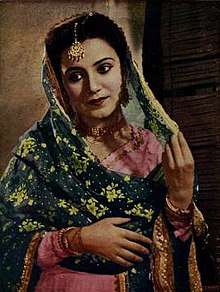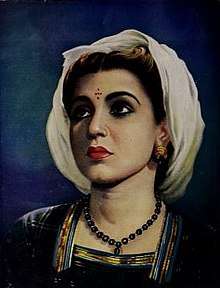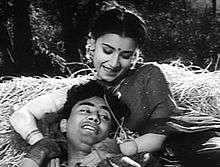Rehana (actress)
Mushtar Jehan was an Indian and Pakistani film actress. She was born in Bombay, British India.
Mushtar Jehan | |
|---|---|
Mustar in 1951 film Adaa | |
| Born | Mushtar Jehan[1] Bombay, British India |
| Occupation | Actress |
| Years active | 1947–1983 |
Early career

After doing dancing roles and small roles in films like the K. L. Saigal-Suraiya-starrer Tadbir, she got her major break in Hum Ek Hain (1946), which was incidentally Dev Anand's first film. Sajan (1947) had Mushtar in the female lead, and following the success of this film, as well as Shehnai (1947), she became an "overnight star".[2] From 1948 to 1951 was the best phase of her career as she did a variety of films paired opposite most of the top heroes of that time, like Prem Adib in Actress (1948), with Raj Kapoor in Sunehre Din (1949) and Sargam (1950), with Dev Anand in Dilruba (1950), with Shyam in Nirdosh (1950) and Surajmukhi (1950), with Shekhar in Ada (1951) and with Premnath Sagai (1951). Two of her biggest hits from these were Sargam (1950) and Sagai (1951).
After 1952, her career sharply went on the decline as films like Rangeeli (1952), Chham Chhama Chham, Hazar Raatein (1953) and Samrat (1954) all sank at the box office. With her career on the decline in India, Mushtar migrated to Pakistan with the hope of continuing her career there.[1]
Controversies

She is regarded as Hindi cinema's first "jhatka queen".[1][3] Whether it was her infamous "lesbian act" with Nigar Sultana in Sunehre Din (1949), or the famous bath scene in Dilruba (1950), Mushtar stayed in the news. Shin Sinaki Boobla Boo (1952) became the first film to be banned by the Ministry of Information and Broadcasting because of its low moral tone, even when it was certified for unrestricted public viewing by the censor board of India. Immense public support for the actress made the information and broadcasting ministry of the central government bow down and allow the unrestricted release of the film, but the huge delay reduced its success at the box office.[2]
In 2010, Mushtar's family filed a case against film producer Ekta Kapoor and director Milan Luthria, at the Allahabad High Court and the legal notice says that the filmmaker has used the name Mushtar without her consent in the film Once Upon A Time in Mumbaai and it has maligned her image.[3]
Filmography

- 1946 Hum Ek Hain
- 1947 Sajan
- 1947 Sati Toral
- 1947 Shehnai
- 1948 Actress
- 1948 Khidki
- 1949 Sunehre Din as Renu
- 1950 Dilruba as Roopa
- 1950 Lajawab
- 1950 Sargam
- 1951 Adaa
- 1951 Sagai as Chandni
- 1951 Saudagar
- 1952 Chham Chhama Chham
- 1952 Shin Shinaki Boobla Boo
- 1954 Samrat
- 1955 Ratna Manjari
- 1956 Delhi Durbar
- 1956 Dhola Maru
- 1956 Qeemat
- 1956 Wehshi
- 1957 Mehfil
- 1960 Raat Ke Rahi[4]
- 1961 Zabak
- 1962 Aulad[5]
- 1963 Hamrahi
- 1963 Kan Kan Men Bhagwan
- 1964 Chitralekha
- 1964 Roop Sundari
- 1966 Teesri Kasam
- 1983 Betaab
References
- "Mushtar". upperstall.com. Upperstall. Retrieved 18 February 2016.
- "Mushtar". cineplot.com. Cineplot. Retrieved 18 March 2015.
- "Once Upon A Time... in trouble again". indiatimes.com. Times of India. Retrieved 18 February 2016.
- Gazdar, Mushtaq (1997). Pakistan Cinema, 1947-1997. Oxford University Press. p. 249. ISBN 0-19-577817-0.
- Gazdar, Mushtaq (1997). Pakistan Cinema, 1947-1997. Oxford University Press. p. 250. ISBN 0-19-577817-0.